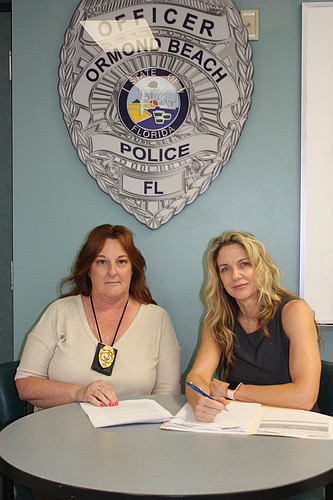- April 17, 2024
-
-
Loading

Loading

The right to bear arms. Active shooter. Suicides. Mental health issues. These terms are part of an active debate in America that rises up after every mass shooting.
The shooting at Marjory Stoneman Douglas High School on Feb. 14, 2018 in Parkland brought the issue to the forefront, and all of the discussion actually resulted in a state law that currently has an impact here in Ormond Beach.
Commonly known as the red flag law, a Risk Protection Order allows guns to be taken away temporarily from people who present a danger to themselves or others, and it has been utilized more than 20 times in the city since its passage in March, 2018.
A two-person team handles the program in Ormond Beach, Assistant City Attorney Ann-Margret Emery and Ormond Beach Police Detective Benita Hamilton.
A person might not think it would be much of an issue in Ormond Beach, but there have been a variety of cases, including suicidal people, domestic violence cases and people threatening neighbors. Some of the subjects were being treated for drug or psychiatric problems.
Since the statute was enacted, Ormond Beach has had more petitions for risk protection orders than any other city in Volusia County, according to Circuit Judge Kathryn D. Weston, who handles all cases in the county. The Sheriff’s Office has had 139 and Ormond Beach has had 21. The total is 195 when other cities are added.
“The Ormond Beach Police Department has done a nice job of putting in place a system and process to handle cases in a timely manner. It’s time intensive,” Weston said.
The cases can arise from a police incident report, a call from a concerned relative, a Baker Act, etc. A hearing is held with a circuit judge who decides if a Risk Protection Order is warranted.
The job demands a lot of time from Emery and Hamilton, who must investigate cases and represent the city at the hearings. They say they want to be proactive.
“If we can keep one person from harming themselves or others, it’s worth it,” Emery said.
The cases are handled in the mental health section of the 7th Circuit Court, the same as the Baker Act and the proceedings are civil and noncriminal. However, if a person does not comply with a Risk Protection Order, they face a third-degree felony charge.
Detective Hamilton investigates cases to determine if the law should be applied. But she wants people to realize they are not trying to infringe on anyone’s second amendment rights.
“We’re here to help people,” she said. “We treat people with respect and dignity. I try to reach out to them and say, ‘Maybe you shouldn’t have a gun.’”
She relates the story of a person with mental health issues who had gone off their medication and fired a gun. A Baker Act was called, and when Hamilton arrived, the subject fired shots in her direction.
“There are people with a mental disorder and to the extent we give them time to get stabilized, I think it works.”
DETECTIVE BENITA HAMILTON, on Risk Protection Orders
Hamilton said the subject has called her two or three times since the Risk Protection Order was made to thank her and tell her he understands why it was done.
“You’re never going to stop a person from buying a gun on the street,” she said. “But there are people with a mental disorder and to the extent we give them time to get stabilized, I think it works.”
Weston also said she has seen suicidal cases where the respondents were grateful that someone got involved and they no longer have access to a gun.
“They get a cooling off period,” she said.
However, in other cases, the subjects can be unhappy with the proceedings and disagree that a protection order is justified. Sometimes the subject is successful in fighting the risk protection order, Weston said. For example, the hearing may find that a witness exaggerated.
After law enforcement files an affidavit on why a gun should be removed, a hearing is held within days.
The subject can then voluntarily comply with the order, or contest it. If he contests, it, the judge can issue a temporary order to take the gun, and issue a date for a Final Risk Protection Order hearing. The court will also decide if a mental health evaluation is needed. If the subject has not already turned in the gun to the law enforcement agency, he must do so right away.
Emery said that in Ormond Beach, 75% of the time, the subjects voluntarily give up the gun.
Weston said that in the majority of cases a gun is removed for a year, but it can be less. Also, the respondent can request that an order be voided and a hearing will be held. At the end of the term, the law enforcement agency can request an extension.
Hamilton said they will investigate to see if the subject complied with mental health evaluations or disobeyed the Risk Protection Order to determine if they will ask for an extension.